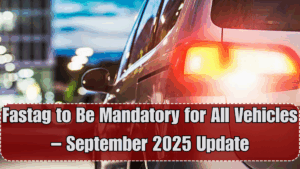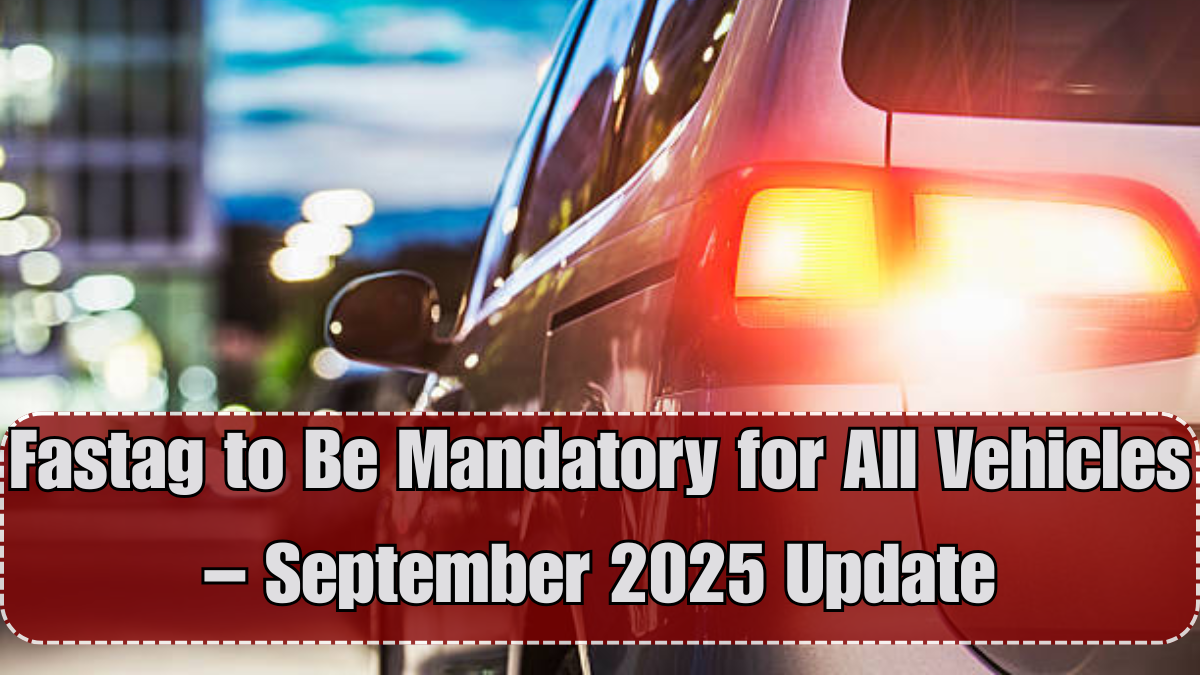The Fastag mandatory 2025 rule is now officially in effect across India from September 1, 2025. In a major move to streamline toll collection and reduce congestion at toll plazas, the Ministry of Road Transport and Highways (MoRTH) and the National Highways Authority of India (NHAI) have enforced the latest regulation that makes Fastag compulsory for all categories of vehicles, including two-wheelers, tractors, and older private vehicles.
Fastag, an electronic toll collection system powered by RFID technology, has already seen widespread adoption since its initial rollout. However, the new Fastag mandatory 2025 policy leaves no exceptions — all vehicles, regardless of usage, fuel type, or age, must now have an active Fastag to pass through any national or state toll plaza in India.

What Has Changed Under the New Fastag Rule?
Until now, Fastag was mandatory for four-wheelers and commercial vehicles, while exemptions were made for certain categories like agricultural vehicles, two-wheelers, and vintage cars. The new rule eliminates all exemptions (except for emergency vehicles), ensuring that 100% of toll-paying traffic moves digitally.
Key Highlights of the September 2025 Rule:
-
Fastag mandatory for all vehicles including two-wheelers using highways
-
No cash payments allowed at any toll plaza nationwide
-
Penalty fines up to ₹1,000 for using toll roads without valid Fastag
-
Integration of Fastag with vehicle fitness and insurance renewal systems
-
Mandatory Fastag ID during new vehicle registration and resale
With this, the government expects smoother toll operations, better traffic control, and enhanced digital tracking of vehicles on India’s expanding expressway networks.
Categories of Vehicles Now Covered
Here is a simplified breakdown of vehicles now required to comply with Fastag mandatory 2025 norms:
| Vehicle Type | Fastag Requirement | Comments |
|---|---|---|
| Private Cars (New & Old) | Mandatory | Even pre-2017 models must comply |
| Two-Wheelers | Mandatory if using toll routes | Fastag required for expressway entry |
| Commercial Vehicles | Mandatory | Must link with fitness & tax documents |
| Tractors & Agricultural Vehicles | Mandatory on highways | Exempted earlier, now covered |
| Vintage/Classic Cars | Mandatory | No longer exempt unless museum-registered |
| Government Vehicles | Mandatory unless emergency use | Defense, ambulances still exempt |
Even vehicles in rural regions that rarely use toll roads must have Fastag ready when entering any NHAI-controlled expressway.
How to Get a Fastag in 2025
If your vehicle doesn’t yet have a Fastag, you need to act immediately. Obtaining and activating one under the Fastag mandatory 2025 regulation is simple and fast.
Here’s how you can get one:
-
Visit any authorized bank (ICICI, HDFC, SBI, Axis, etc.) or petrol pump with Fastag services
-
Submit RC copy, ID proof, and a passport-size photo
-
Pay issuance fee (₹100–₹200) and recharge as needed
-
Link Fastag to your bank account or prepaid wallet
-
Install the RFID tag on your windshield or vehicle body (for two-wheelers)
Most auto dealerships now include Fastag by default during new vehicle delivery as part of standard compliance with the India toll regulation.
Benefits of Fastag for Everyday Users
Making Fastag universal is not just about enforcement — it’s designed to enhance road travel for all categories of drivers and reduce human error in toll operations.
Key Benefits:
-
Faster travel through toll plazas with dedicated Fastag lanes
-
Reduced fuel consumption due to no idling in long queues
-
Transparent toll deductions with SMS alerts and statements
-
No need to carry change or stop for manual payments
-
Ease in managing multiple vehicles with centralized tracking
Additionally, NHAI offers cashback incentives and auto-recharge options for regular highway users under its digital mobility plan.
What Happens If You Don’t Comply?
Non-compliance under Fastag mandatory 2025 rules may lead to:
-
Immediate fines at toll gates (₹200–₹1,000 depending on vehicle type)
-
Denial of toll plaza access, resulting in delays and route diversion
-
Complications in insurance renewal, as Fastag number may be linked to your policy
-
De-registration warnings for repeated violations
So whether you’re a city commuter or occasional highway traveler, updating your vehicle with an active Fastag is now legally required.
FAQs
What is the Fastag mandatory 2025 update?
It refers to the Indian government’s regulation that mandates Fastag for all vehicles — including two-wheelers and rural vehicles — effective from September 2025.
Is Fastag needed even if I rarely use toll roads?
Yes. Under the Fastag mandatory 2025 law, all vehicles registered in India must carry Fastag, regardless of usage frequency.
Are there any exemptions?
Only emergency vehicles like ambulances, fire engines, and defense vehicles remain exempt. All others must comply, including tractors and vintage vehicles.
What happens if I drive without Fastag?
You may be fined at toll plazas and denied access to expressways. Continued non-compliance can affect insurance renewal and vehicle documentation.
Can I buy Fastag online?
Yes. Many banks, Paytm, PhonePe, and official NHAI partners offer online Fastag purchase and doorstep delivery.
Click here to know more.




